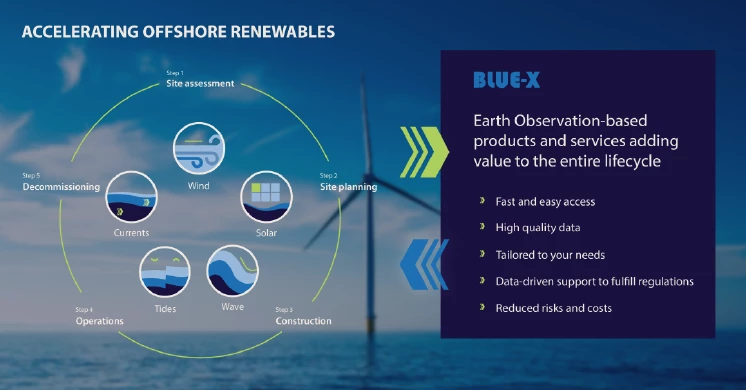Seven European partners, including offshore renewable energy and Earth Observation specialists, have teamed up for the BLUE-X project. Together, they will develop a satellite-based decision support tool to accelerate offshore renewable energy deployments.
This is the first blue energy Horizon Europe project funded by the EU Agency for the Space Programme (EUSPA).
More than 75% of the EU’s greenhouse gas emissions are caused by the energy sector. The revised ‘Renewable Energy Directive’ of 2023 raises the binding target to almost double the share of renewables within the EU until 2030.
Blue renewable energy sources such as offshore wind, offshore solar, wave and tidal energy have a high and mostly unused potential in times of a changing global energy policy. In 2020, the European Commission set ambitious targets of 300 GW of offshore wind and 40 GW of ocean energy across all the European Union’s sea basins by 2050. However, achieving these calls for thorough and time-consuming MetOcean, geophysical and environmental campaigns.
‘Increasing the share of blue energy is a key building block for reaching the goals of the Green Deal. Scaling up the use of Copernicus satellite data can support the rapid and fact-based decision-making needed’, says Fiammetta Diani, Head of Market Downstream and Innovation at EUSPA, reminding that BLUE-X aims to help the acceleration of the energy transition in the European Union.
For upscaling offshore renewables, BLUE-X will provide key data useful for all five steps of the blue energy lifecycle: site assessment, planning, construction, operations, and decommissioning. ‘Our mission is to give valuable decision-support to offshore renewable energy projects. We aim for a tool that is easy to use and offers quick access to key data on the coastal areas in question,’ states Kim Knauer of EOMAP, leading the BLUE-X consortium.
Six use cases across Europe will ensure a BLUE-X solution in line with the user demands of offshore renewable energy developers and providers. These cases will cover various blue offshore energy sources.
The consortium partners include the Dutch Marine Energy Centre (DMEC, The Netherlands), EOMAP (Germany), Fórum Oceano (Portugal), INESC TEC (Portugal), Inyanga Marine Energy Group (France/UK), Politecnico di Torino (Italy) and Wave for Energy (Italy).
About EUSPA
The European Union Agency for the Space Programme (EUSPA) provides safe and secure European satellite navigation services, advances the commercialisation of Galileo, EGNOS, and Copernicus data and services, engages in secure satellite communications (GOVSATCOM & IRIS2), and operates the EUSST Front Desk. By fostering innovation in the space sector and above and collaborating with the EU Space community, EUSPA contributes to the European Green Deal and digital transition, enhances Union safety and security, and strengthens autonomy and resilience.



























